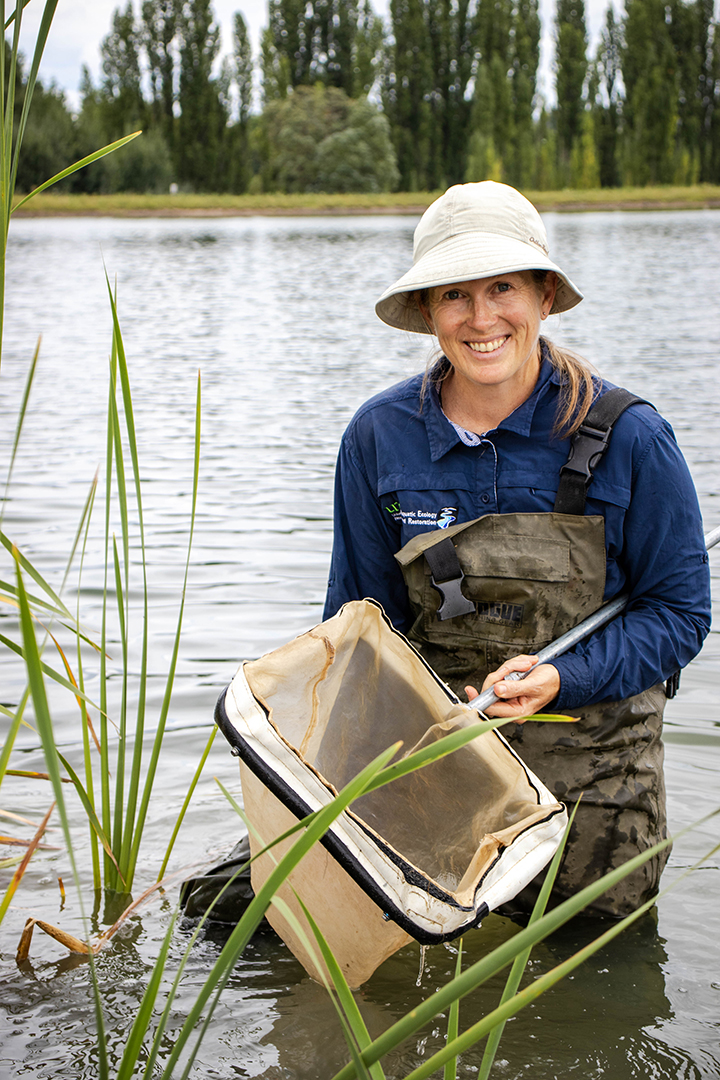For UNE’s Lindsey Frost, a river, stream, lake or wetland is where she feels most at home.
So, when the opportunity arose to study a PhD that would combine her love of water with science to protect our precious wetland environments, she knew it was something she couldn’t pass up.
Ahead of World Wetlands Day (Thursday 2 February), we caught up with her to find out more about her research, and what her message is to people on this important day.
What is your research area, and where did your interest in this begin?
My research focuses on understanding how food webs in wetlands respond to different inundation patterns. I chose this area of research because I am passionate about effective management of our precious freshwater resources and I believe that a good understanding of ecosystem processes, like the flow of energy through food webs, provides a solid foundation for making informed and effective management decisions.
I have always loved being in freshwater environments. I’m never happier than when I’m in a river, stream, lake or wetland. I also have a curious mind which led to me pursue an environmental science degree at UNE in my late twenties. Once I realised that I could do science in freshwater environments there was no going back.
How is your research contributing to conserving our wetlands?
My research is specifically about understanding responses of temporary wetlands to inundation. It is natural for temporary or floodplain wetlands to have areas that dry out completely, in fact this is a really important part of how these wetlands function. When the water comes again a lot of intricate processes are kicked off that ultimately lead to these areas supporting a huge and diverse amount of life. Plants and animals, large and small, flourish in these environments. Sadly, many wetlands in developed river basins no longer experience natural flows that support these boom (wet) and bust (dry) cycles. The management of water for human use means that a lot of water that would once have reached the wetlands no longer does. Instead, we work hard to maintain the health of the wetlands through managed delivery of water – environmental flows. To make sure we get the most value out of the limited water we have, we need to understand how the water we deliver influences how the wetlands respond. That’s where my research comes in.
What can we all start doing to help conserve these precious biodiversity hotspots, and what is your message to people this World Wetlands Day (Thursday 2 February)?
Learn to recognise a dry wetland on your land and look after it. Because it is natural for these wetlands to dry out periodically, you might not always spot them in the landscape. If we can’t recognise them as wetlands, then they might get lost to other land uses. A dry wetland will occur in depressions in the landscape and often has particular vegetation in it that persists even in the dry times. Sedges rather than grasses, that sort of thing. Another thing I would encourage everyone to do is to visit some wetlands and see what there is to love about them. It is hard for us to conserve things we don’t care about or understand so get out and get to know your local wetland! It will be amazing, trust me.
My message to people this World Wetlands Day is that a wetland isn’t always wet but it is always wonderful. Also, that wetlands aren’t only important for fish and birds and insects, they’re really important for humans. They provide food, water, textiles and many other resources to humans around the world, and they also act as filters in the landscape – cleaning our water, storing nutrients and helping to add moisture to our soils.
What are your biggest pieces of advice to someone wanting to embark on a PhD, or undertake tertiary study in a similar field?
Ask yourself why you want to do this. It’s not a glamorous journey – have a good reason! For me personally, status is not that reason. Someone actually gave me the same advice early on and he said ‘Remember that it’s like a club. When you don’t have a PhD it is really important to get one to join the club, but as soon as you’re in everyone has one so you’re not special.’ Someone else very wisely told me ‘You don’t have to be smart to do a PhD, you have to be stubborn.’ THAT was very true! So, have a good reason, be prepared to fail repeatedly – if this was easy someone else would already have done it, and pick something you love enough to stick with.








